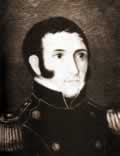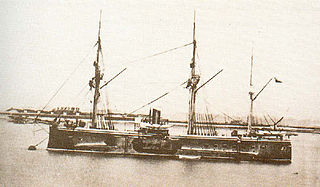This article needs additional citations for verification .(February 2024) |
| |||||
| Decades: | |||||
|---|---|---|---|---|---|
| See also: | |||||
The following lists events that happened during 1876 in Chile .
This article needs additional citations for verification .(February 2024) |
| |||||
| Decades: | |||||
|---|---|---|---|---|---|
| See also: | |||||
The following lists events that happened during 1876 in Chile .

Agustín Manuel de Eyzaguirre y Arechavala was a Chilean political figure. He served as Provisional President of Chile between 1826 and 1827.

Manuel José Blanco y Calvo de Encalada was a vice-admiral in the Chilean Navy, a political figure, and Chile's first President (Provisional) (1826).

The Battle of Yungay was the final battle of the War of the Confederation, fought on January 20, 1839, near Yungay, Peru. The United Restoration Army, led by Chilean General Manuel Bulnes, consisting mainly of Chileans and 600 North Peruvian dissidents, attacked the Peru-Bolivian Confederation forces led by Andrés de Santa Cruz in northern Peru, 200 kilometers (120 mi) north of Lima.

Presidential elections were held in Chile on July 8, 1826. The National Congress of Chile voted to elect the first President of the Republic of Chile.

Martín Calvo de Encalada y Recabarren was a Chilean politician who participated as a member of Congress during the Chilean War of Independence.
Several ships of the Chilean Navy have been named Blanco Encalada after Manuel Blanco Encalada (1790–1876), a Vice Admiral and Chile's first President

Ventura Blanco y Calvo de Encalada was a Chilean political figure.

Blanco Encalada was a central battery ship built by Earle's Shipbuilding Co. in England for the Chilean Navy in 1875. She was nicknamed El Blanco. She participated actively in the War of the Pacific, her most important action being the capture of the Peruvian monitor Huáscar during the Battle of Angamos.
The first battle of Cancha Rayada, sometimes termed the 'Disaster' or 'Surprise of Cancha Rayada', took place on 29 March 1814, during the War of Chilean Independence.
Manuel Blanco may refer to:

The torpedo gunboat Almirante Lynch and her sister ship Almirante Condell, were purchased in England and launched in 1890.

The Battle of Caldera Bay, or the Sinking of Blanco Encalada, was a naval engagement fought in the Caldera Bay during the 1891 Chilean Civil War between Balmacedist and Congressional naval forces on 23 April 1891. It involved two Balmacedist torpedo boats of the Almirante Lynch-class, and the Congressional armored frigate Blanco Encalada.
Blanco Encalda may refer to:

Águila was the first naval vessel of the Chilean Navy. She was later renamed Pueyrredón.

Chacabuco was a 20-gun corvette of 450 tons built in 1815 in Boston, USA. She came to Coquimbo as Avon where investors in Copiapó, Chile, purchased her to use her as privateer vessel under the name Coquimbo. But as the businessmen drew back, the Chilean government bought the ship on 20 June 1818 for $36,000. She was renamed Chacabuco and commissioned to the Navy under the command of Captain Francisco Díaz.
The following lists events that happened during 1818 in Chile.
The following lists events that happened during 1826 in Chile.
The following lists events that happened during 1856 in Chile.
Battle of Pudeto was an attack by Chilean patriot forces during the 1826 campaign on the Spanish stronghold of Chiloé in southern Chile.

The Capture of the corvette Pilcomayo was a battle of the Naval campaign of the War of the Pacific. In the battle, the Peruvian gunboat Pilcomayo was captured by the Chilean ironclad Blanco Encalada after a brief confrontation.